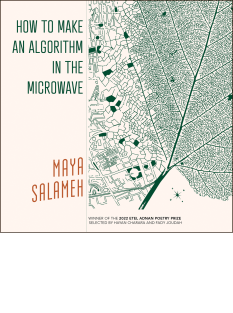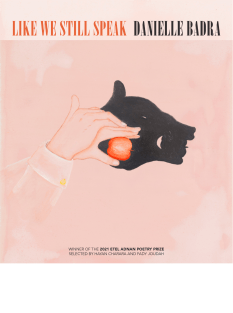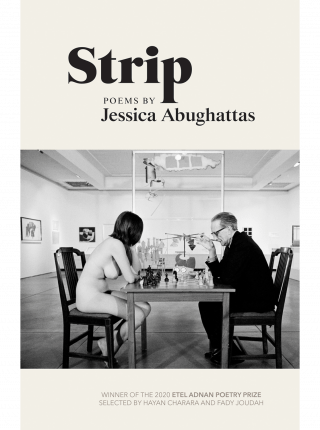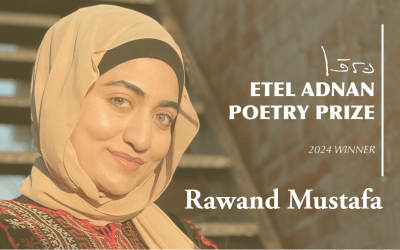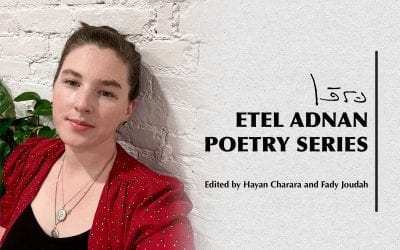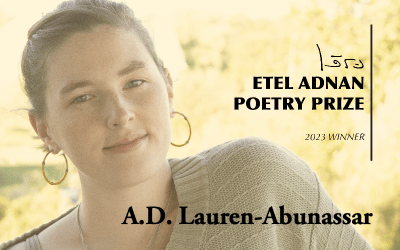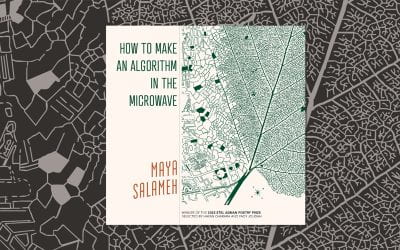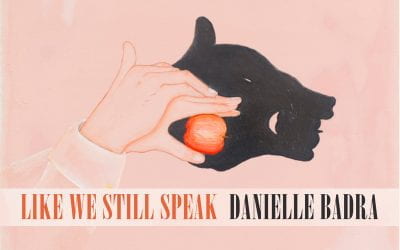New and Forthcoming Titles
Submit
The submission deadline for the 2024 Etel Adnan Poetry Prize has been extended to 1 May 2023.
Start Application
Submission Requirements
Publication history. Only first or second full-length books of poetry may be submitted. Chapbooks are not considered as a previous publication in this regard.
Length. Manuscripts must be between forty-eight and ninety pages.
Previous publication. Individual poems may have been published in chapbooks, journals, and anthologies.
Translations. Work in translation is not accepted.
Multiple submissions. No more than one manuscript per author.
Authorship. No more than one author per manuscript.
Simultaneous submissions. Manuscripts under publication consideration or prize competition elsewhere are allowed provided we are notified immediately of their acceptance.
Application Instructions
Period. Applications are accepted year-round with a rolling deadline of 1 April.
Personal information. Applicants should provide the title of their collection, their name, an address, a telephone number, and an email address.
Manuscript content. The first page of the manuscript should start with the title of the collection, followed by a table of contents, and then the poems. Part titles and epigraphs may be included. An acknowledgments page detailing publication history of individual poems may also be included. Dedications or any personal information should not be included.
Anonymity. Submissions are judged anonymously. The author’s name and contact info should be submitted on the web page where you upload your manuscript but nowhere in the uploaded file. No specific identifying information should appear anywhere in the manuscript.
File formats. We recommend authors submit their manuscripts as a PDF, which offers the most reliable representation of what is seen on the writer’s computer. Microsoft Word documents (.doc) and Rich-Text Format documents (.rtf) are also acceptable but may display text and formatting differently when opened on the judge’s computer.
Revisions. No revisions will be accepted once the application is complete and the manuscript is uploaded. The winning author will have an opportunity to revise the manuscript before publication.
Readers’ fee. A readers’ fee of $25 must be paid at the time of submission. Major credit cards and PayPal are accepted. No checks, transfers, or cash can be accepted.
Selection. The winner will be announced by 15 September.
Past Winners
| Title | Author | Year | Award | |
|---|---|---|---|---|
| Like We Still Speak | Danielle Badra | 2021 | Winner | |
| Strip | Jessica Abughattas | 2020 | Winner | |
| A Theory of Birds | Zaina Alsous | 2019 | Winner | |
| Our Earliest Tattoos | Peter Twal | 2018 | Winner | |
| the magic my body becomes | Jess Rizkallah | 2017 | Winner |
News
The 2024 Etel Adnan Poetry Prize Has Been Awarded to Rawand Mustafa
Umbilical Discord will be published in the Spring of 2025.
Now Available: Coriolis by A. D. Lauren-Abunassar
Winner of the 2023 Etel Adnan Poetry Prize
Announcing the Forthcoming Publication of Coriolis
New collection from A. D. Lauren-Abunassar is the winner of the 2023 Etel Adnan Poetry Prize.
The 2023 Etel Adnan Poetry Prize Has Been Awarded to A.D. Lauren-Abunassar
The University of Arkansas Press is pleased to announce the 2023 Etel Adnan Poetry Prize has been...
Now Available! How to Make an Algorithm in the Microwave by Maya Salameh
Winner of the 2022 Etel Adnan Poetry Prize.
Virtual Event: Danielle Badra at Fayetteville Public Library’s UA Press Author Spotlight
Tuesday, April 5 from 6-7pm.
About the Series
Every year the University of Arkansas Press accepts submissions for the Etel Adnan Poetry Series and awards the $1,000 Etel Adnan Poetry Prize to a first or second book of poetry, in English, by a writer of Arab heritage. Since its inception in 2015 the series has sought to celebrate and foster the writings and writers that make up the vibrant and diverse Arab American community, and the University of Arkansas Press has long been committed to publishing diverse kinds of poetry by a diversity of poets. The series editors are Hayan Charara and Fady Joudah, and the prize is named in honor of the world-renowned poet, novelist, essayist, and artist Etel Adnan.
Though poets of Arab heritage have been writing in English for more than a century, little attention had been paid to these poets as a community. In 2008 the publication of Inclined to Speak, an anthology of contemporary Arab American poetry edited by Hayan Charara and published by the University of Arkansas Press, brought attention to the diversities and talents of this already established but growing group of poets. Since the anthology’s publication in 2008, many more new poets of Arab heritage have emerged, and their work continues to challenge and reinvent not only the aesthetics they have inherited but also the very notions of what it means to be Arab or Arab American. Hayan Charara and Fady Joudah, themselves celebrated poets, felt the time was ripe for a series that simultaneously valued the larger community to which these new poets belonged, as well as their engagement with new and innovative poetics.
About the Prize
The series editors serve as the judges for the Etel Adnan Poetry Prize in addition to the occasional guest judge appointed by the editors. Together, they will select a winning manuscript and write a preface for the book. The University of Arkansas Press, which will publish the book, provides that the author’s work will be produced with all the dedication and expertise they have to offer. This includes professional copyediting by expert poetry editors, design and production by veteran designers who specialize in the typesetting of verse, and production managed by a house with a history of printing first-rate books. Additionally, the author will receive a $1,000 prize and will widely publicize the winning book. We believe this offers the poet the best possible opportunity to connect with his or her audience via the printed word.
About the Editors

Hayan Charara
Series Coeditor
Hayan Charara is a poet, children’s book author, essayist, and editor. His poetry books are Something Sinister (2016), The Sadness of Others (2006), and The Alchemist’s Diary (2001). His children’s book, The Three Lucys (2016), received the New Voices Award Honor, and he edited Inclined to Speak (2008), an anthology of contemporary Arab American poetry. His honors include a literature fellowship from the National Endowment for the Arts, the Lucille Joy Prize in Poetry from the University of Houston Creative Writing Program, the John Clare Prize, and the Arab American Book Award.
Born in Detroit in 1972 to Arab immigrants, he studied biology and chemistry at Wayne State University before turning to poetry. He spent a decade in New York City, where he earned a master’s degree from New York University’s Draper Interdisciplinary Master’s Program. In 2004, he moved to Texas, where he eventually earned his PhD in literature and creative writing at the University of Houston.
He has taught at a number of colleges and universities, including Queens College, Jersey City University, the City University of New York-La Guardia, the University of Texas at Austin, Trinity University, and Our Lady of the Lake University. He currently teaches in the Honors College and the Creative Writing Program at the University of Houston.
He is married, with two children.
(Photo by Rachel de Cordova)

Fady Joudah
Series Coeditor
Fady Joudah is a Palestinian American physician, poet, and translator. He was born in Austin, Texas, and grew up in Libya and Saudi Arabia. He was educated at the University of Georgia, the Medical College of Georgia, and the University of Texas Health Sciences in Houston. In 2002 and 2005 he worked with Doctors Without Borders in Zambia and Sudan, respectively.
Joudah’s debut collection of poetry, The Earth in the Attic (2008), won the 2007 Yale Series of Younger Poets competition, chosen by Louise Glück. Joudah followed his second book of poetry, Alight (2013) with Textu (2014), a collection of poems written on a cell phone wherein each piece is exactly 160 characters long. His fourth collection is Footnotes in the Order of Disappearance (2018). In 2014, Joudah was a Guggenheim Fellow in poetry.
As critic Charles Bainbridge observed in a 2008 Guardian review of The Earth in the Attic, “Joudah’s poetry thrives on dramatic shifts in perspective, on continually challenging received notions.”
Joudah translated several collections of Palestinian poet Mahmoud Darwish’s work in The Butterfly’s Burden (2006), which won the Banipal prize from the UK and was a finalist for the PEN Award for Poetry in Translation; and in If I Were Another, which won a PEN USA award in 2010. His translation of Ghassan Zaqtan‘s Like a Straw Bird It Follows Me (2012) won the Griffin International Poetry Prize in 2013. His other translations include Amjad Nasser‘s Petra: The Concealed Rose and A Map of Signs and Scents.
Joudah lives with his family in Houston, where he works as a physician of internal medicine.
(Photo by Cybele Knowles)
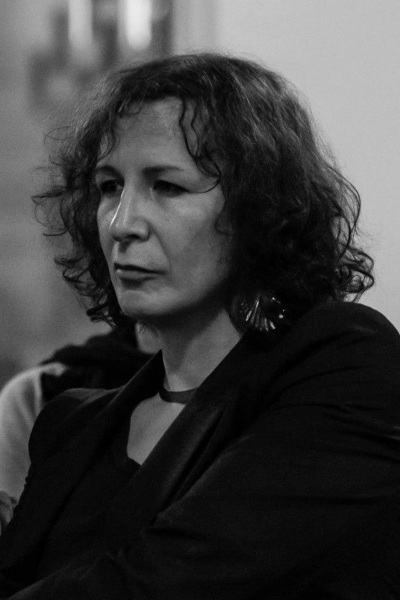
Trish Salah
2024 Guest Judge
Born in Kjipuktuk (Halifax), Trish Salah is the author of Wanting in Arabic (TSAR 2002, Mawenzi House 2013) and Lyric Sexology Vol. 1 (Roof 2014, Metonymy 2017). In 2014 Wanting in Arabic was awarded a Lambda Literary Award for Transgender Fiction, and Salah has been shortlisted for the Dayne Ogilvie prize for emerging LGBTQ writers and nominated for a Pushcart Prize. Her writing appears in recent and forthcoming issues of Mizna, Room Magazine, Teflon, Traffic Report, Tripwire and Vallum and in the anthologies, Arab Divas, Meanwhile Elsewhere, rumi roaming, and We Want It All: An Anthology of Radical Trans Poetics. She edits the Journal of Critical Race Inquiry and is co-editor of special issues of TSQ: Transgender Studies Quarterly, on cultural production, and of Arc Poetry Magazine, showcasing trans, Two-Spirit and non-binary writers. While teaching at the University of Winnipeg she co-organized the conferences, Writing Trans Genres: Emergent Literatures and Criticism (2014) and Decolonizing and Decriminalizing Trans Genres (2015). Salah lives in T’karonto and is associate professor of Gender Studies at Queen’s University, which is situated in the traditional territory of the Haudenosaunee Confederacy and the Anishinabek Nation, governed by the Dish with One Spoon Wampum. Her next book is titled, High Reason (a Sexology).
About Etel Adnan

Etel Adnan
Honoree
Born in Beirut, Lebanon, in 1925, Etel Adnan was educated in the French schools there and later studied philosophy at the Sorbonne in Paris, the University of California Berkeley, and Harvard. She became a painter during the Algerian War of Independence and later, during the war in Vietnam, participated in the poets’ movement against the war, becoming, in her own words, “an American poet.” From 1972 until 1976, she lived in Beirut and worked as a cultural editor for two newspapers. Her novel Sitt Marie-Rose, published in 1977, has since been translated into numerous languages and is considered a classic of war literature. In 1977 she established her residence in Sausalito, California, with frequent stays in Paris.
Adnan has published nearly twenty books in English, including The Arab Apocalypse, regarded as “one of the most important works of literature” after the Lebanese Civil War; In the Heart of the Heart of Another Country, “a mix of prose, poetry, political insight, philosophic speculation, and historical remembrance honed to mineral perfection”; and Sea and Fog, winner of the Lambda Literary Award. She is the winner, with translator Sarah Riggs, of the 2020 Griffin Poetry Prize for collection Time. Her poetry and prose has been recognized internationally and includes the France-Pays Arabes Award, the California Book Award, the PEN Oakland/Josephine Miles Literary Award, the Arab American Book Award, and a lifetime achievement award from the Radius of Arab American Writers. In 2014 she was named a Chevalier des Arts et des Lettres by the French government. The same year, a collection of her paintings and tapestries were exhibited as a part of the Whitney Biennial at the Whitney Museum of American Art. MELUS, the journal of the Society for the Study of the Multi-Ethnic Literature of the United States, called Adnan “arguably the most celebrated and accomplished Arab American author writing today.”
She lived in Paris with her partner, the painter and sculptor Simone Fattal, until her death in 2021. More about Adnan is available at www.eteladnan.com.



